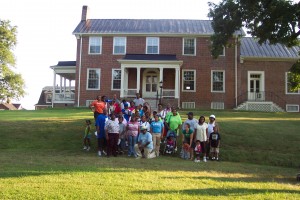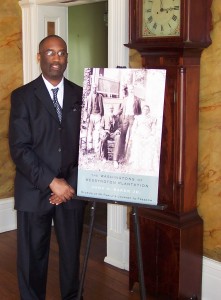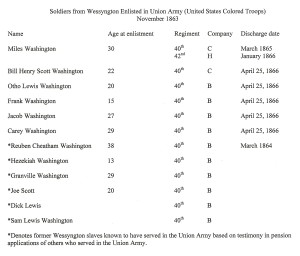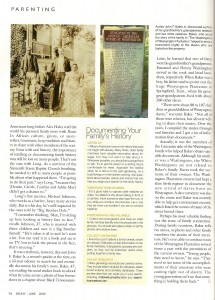In 2008 the Gardners celebrated their 75th annual family reunion. As part of the reunion festivities I led them on a tour of Wessyngton Plantation. The tour included the Wessyngton mansion, Washington family cemetery, slave cemetery and a restored slave cabin. The Gardner earliest ancestors, Aaron Gardner, his wife Betty and their three sons, Daniel, George and Jackson came to Wessyngton in the late 1830s. There are more African Americans in Robertson County, Tennessee with the Gardner surname than any other family.
Archive for May, 2009
Gardner Family Tours Wessyngton Plantation for 75th Family Reunion
Friday, May 29th, 2009Dedication of Enslaved Memorial at The Hermitage
Monday, May 18th, 2009On May 17th a dedication ceremony was held at The Hermitage, the plantation owned by President Andrew Jackson, in honor of 60 African Americans who had been enslaved on the Ingleside and Cleveland Hall Plantations. Both plantations were owned by nephews of Rachel Jackson and had ties to the enslaved population at The Hermitage.
As reported by the Associated Press, a memorial sculpture of seven oak trees in the shape of the Little Dipper was laid out among a circle of thirty boulders. The piece by Lee Benson is named “Our Peace, Follow the Drinking Gourd.” Slaves fleeing to the North would follow the North Star, one of the stars in the Little Dipper.
Following the ceremony I gave a presentation and did a book signing. It was a very special and meaningful event.
Television Interview with John Seigenthaler Sr.
Monday, May 18th, 2009My half-hour television interview with John Seigenthaler Sr, A Word on Words, is available as a free downloadable Podcast.
http://www.wnpt.org/productions/wow/
Mr. Seigenthaler asked me many in-depth thought-provoking questions. At the end, he said, “I learned more from your book than I learned from reading my friend Alex Haley’s book called Roots.” I hope you enjoy the interview. Leave a comment with your reaction.
How Can We Honor Our Ancestors on Memorial Day?
Monday, May 18th, 2009On Memorial Day, we need to take a moment to tell our children about their ancestors who fought for freedom and America. During the Civil War, our ancestors fled slavery and the plantations and joined the Union Army to fight for freedom. We must never forget the sacrifices of our ancestors that we might enjoy freedom today.
My Story in June Issue of Ebony
Monday, May 11th, 2009Check out my story in this month’s Ebony. “Telling our Stories: Relaying family history to children can keep our heritage alive.” On page 94, Shirley Henderson describes my story. A photograph of my ancestors and the Wessyngton Plantation slave cemetery memorial illustrate the article.
How Can We Honor Our Mothers on Mothers Day?
Thursday, May 7th, 2009
What better way to honor our mothers and our maternal ancestors than to tell our children about the sacrifices made so that the lives of future generations could be lives well lived. When I think of what our great-great-grandmothers endured in the times of slavery and early emancipation I know that their sacrifices should not be forgotten. Please take a moment on Mothers Day to honor our ancestors.
Portraits by [Maria] Howard Weeden
Tuesday, May 5th, 2009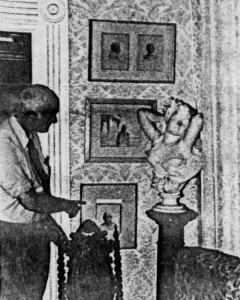
In the 1890s the Washington family contracted the famous artist [Maria] Howard Weeden to paint portraits of several African Americans. These portraits hung in the plantation mansion. In this photograph Preston Frazer, a Washington descendant, is seen with the portraits. The portraits remain in the Washington family.
Would you share a photo of a portrait of your ancestors with others? Please send a photo to me with a short e-mail telling me about it. Also please let me know if I could post the photo and the information on my blog. I would not post your name or e-mail address. Thank you. john@johnbakerbooks.com
The Founding of Wessyngton Plantation
Tuesday, May 5th, 2009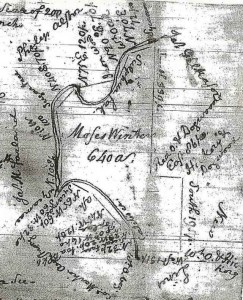
1785 Land Grant to Moses Winters
{Deed}
Stories of the founding of Wessyngton Plantation have been passed down through generations of the Washington family. These stories were corroborated by deeds and other documents I found in the Washington Family Papers in the Tennessee State Library and Archives in Nashville. In this deed, we learn that Moses Winters was granted 640 acres of land for military service in the Revolutionary War. Joseph Washington later bought this land which became part of the Wessyngton estate.
John Baker Presents Mrs. Ann Nixon Cooper with The Washingtons of Wessyngton Plantation-Video
Saturday, May 2nd, 2009Baker-Presents-His-Book-to-Mrs-Cooper
While in Atlanta for a presentation and book signing at Auburn Research Library for the National Black Arts Festival in February I had the honor of presenting Mrs. Ann Nixon Cooper a copy of my book; The Washingtons of Wessyngton Plantation: Stories of My Family’s Journey to Freedom. I also had Mrs. Cooper to sign a copy of the book for me on the page she was pictured on. Mrs. Cooper is now 107 years old.
Native Americans on Wessyngton Plantation
Friday, May 1st, 2009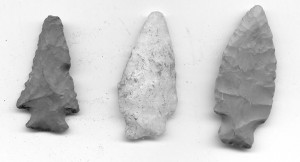
Native American Arrowheads found at Wessyngton
Based on arrowheads found on Wessyngton Plantation, Native Americans lived in the area thousands of years ago. Arrowheads and other Native American artifacts have been found at Wessyngton by farmers plowing the fields for many years.
During the Cherokee removal known as the Trail of Tears during the 1830s, hundreds of Native Americans passed through Robertson County, Tennessee. Descendants of the Washington family and African Americans who lived at Wessyngton told their descendants that Native Americans came to the Wessyngton mansion to get food and water enroute to Port Royal. They were marched from Port Royal to Hopkinsville, Kentucky where they spent the winter of 1838-39. From Hopkinsville they were forced on to the reservations in Oklahoma.
